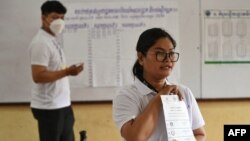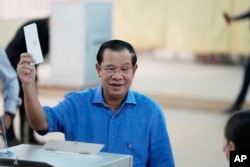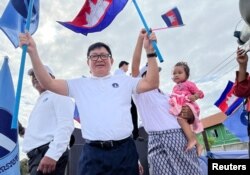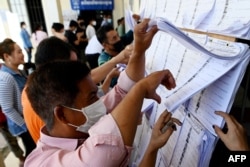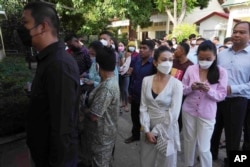Early projections show the ruling Cambodian People’s Party is headed for a landslide victory in the local elections held Sunday, according to early results broadcast by pro-government officials and the nation’s election body.
According to the National Election Committee, voter turnout stood at 80.19% by 11 a.m. local time and at 77.91% when the polls closed at 3 p.m. Some 9.2 million Cambodians are registered and eligible to vote. An official tally is expected to be released June 26.
Led by longtime autocrat Prime Minister Hun Sen, the CPP won more than 9,000 of the 11,622 council seats being contested in 1,652 commune offices nationwide, preliminary results broadcast Monday by state media showed. Of the 1,652 commune chief positions, CPP won 1,648.
The opposition Candlelight Party is projected to win at least four commune chief positions, collecting some 2,176 commune council seats nationwide, according to the party’s officials Monday.
In each Cambodian commune – administrative territory equivalent to a sub-district or a sub-county – a commune council is formed to govern by the proportionate party-list elections. A councilor from the majority party will lead the council as commune chief.
‘Unfair’ elections
On Sunday, the opposition and the local rights group LICADHO reported irregularities with the ballot-counting process when the polls closed at 3 p.m. local time. It alleged a number of polling stations restricted access to onlookers, closing the doors and windows of stations from scrutiny. It also alleged intimidation tactics against opposition party representatives.
The Candlelight Party (CLP) decried the electoral process as “rigged” and the “worst in history,” citing systematic “bias” to the ruling party by the “weak” electoral authorities. On Monday, the party’s leadership held a news conference to condemn the conduct but added that it would accept the seats won with dissatisfaction.
“These elections are worse than the previous ones in terms of transparency and honesty. The public is not being allowed to witness the vote counting, as required by the National Election Committee (NEC),” CLP founder and ex-leader Sam Rainsy tweeted late Sunday. “Today, thanks to the courage and intelligence of Cambodian democrats who refuse to give up their struggle, the monopoly of power exercised by Hun Sen has been broken at the local level, despite the manipulated and unjust character of these communal elections.”
However, NEC chairman Prach Chan, a former CPP central committee member, called the voting process a success. He also said election day was smooth and peaceful. Asked by reporters at a news conference Sunday afternoon, Chan defended the practice of closing the doors and windows of polling stations during the counting process as well as of local authorities writing down names of those who do or don’t vote.
Last week, the U.N. Human Rights Office said, “We are disturbed by the pattern of threats, intimidation and obstruction targeting opposition candidates ahead of communal elections in Cambodia on 5 June.”
Last elections
The last commune elections in 2017 saw a razor-thin margin between CPP and the Cambodia National Rescue Party, with the latter claiming nearly half of either popular votes or commune council seats. CPP claimed 6,503 seats, while CNRP received 5,007 council seats. CNRP was controversially dissolved in a CPP-controlled court system, and its top 118 party members were hit with five-year bans from political activities.
In 2012, the Candlelight Party merged with the Human Rights Party to form the Cambodia National Rescue Party, which led to the historically strongest electoral performance by the opposition in the 2013 general elections and 2017 local elections.
In 2021, after the CNRP was dissolved, the CLP was reactivated and managed to field candidates nationwide, fielding a group second in size only to the ruling CPP.
However, the reborn CLP was strongly contested by embattled opposition leader Kem Sokha’s HRP faction, leaving the opposition in a fractured state. Sokha's aide, Muth Chantha, told VOA Khmer on Sunday that Sokha would not vote because there was no good option “for him to choose.”
The commune elections, held a year before general elections, are traditionally seen as a test of the ruling party’s strength.
The Sunday poll was held after CPP led a seemingly successful campaign to fight the COVID-19 pandemic, vaccinating more than 93% of the 16 million population against the virus. It was also the first election since Hun Sen named his eldest son, Hun Manet, a three-star general and the nation’s army chief, as his designated successor.
Hun Sen has been in office as premier since 1985 while the CPP has been in power since 1979. The established ruling party entered the race in a position of strength against the 16 other opposition parties with firm controls on state’s institutions, resources, armed forces, grassroots networks, and a well-oiled propaganda machine.
In the northwestern city of Battambang, opposition supporters expressed mixed feelings about the early results.
“Despite losing, we will never back down,” said Soeun Ratha, who volunteered for CLP to observe polling stations in the city’s O’Char commune, “Winning or losing is normal because we may lose today and win back in the future.”
Voters speak up
In Phnom Penh, where all 105 commune-chief positions may go to the CPP, voters interviewed by VOA Khmer called for better public services and integrity in the local administration offices. Many said they preferred to consider individual candidates over party in this ‘party-list voting system’ — which as the name implies, party names and not candidates’ names are on the ballots.
“They [the commune councilors] will be tasked to be our guardians in which we can rely on because I will not look at which party they come from but at the candidates on whether they are capable of developing our community,” Da Ny, a 34-year-old housewife, told VOA Khmer after voting at Phnom Penh’s High School for Fine Arts Sunday morning.
Choeurn Sakhon, who voted at a polling station in Phnom Penh’s Indradevi High School, said local elected leaders should be down-to-earth and take care of those in need.
“They hold a noble role of serving the Khmer people,” Sakhon, 87, said in referring to Cambodia’s hegemonic ethnic group. “We must elect into power those who serve the people – regardless of which party. As long as the individual candidates can fulfill that role, it does not matter which party they come from, I’ll vote for them.”
Keo Chy, a Battambang resident, told VOA Khmer that he wanted newly elected local leaders to strengthen the quality of local services.
“The commune leader elected to receive people’s mandate shall be empowered to provide better administrative services, organize more townhall meetings to listen more to the people and let people participate more with the authorities in the villages and the communes,” Chy, 34, said.
Some other voters, when reached by VOA, declined interviews, citing fears of reprisal.
VOA Cambodian journalists, Thida Win, Sokummono Khan, Kann Vicheika, Sun Narin, Hul Reaksmey, Lors Liblib, Pin Sisovann and Nem Sopheakpanha contributed to this report.




